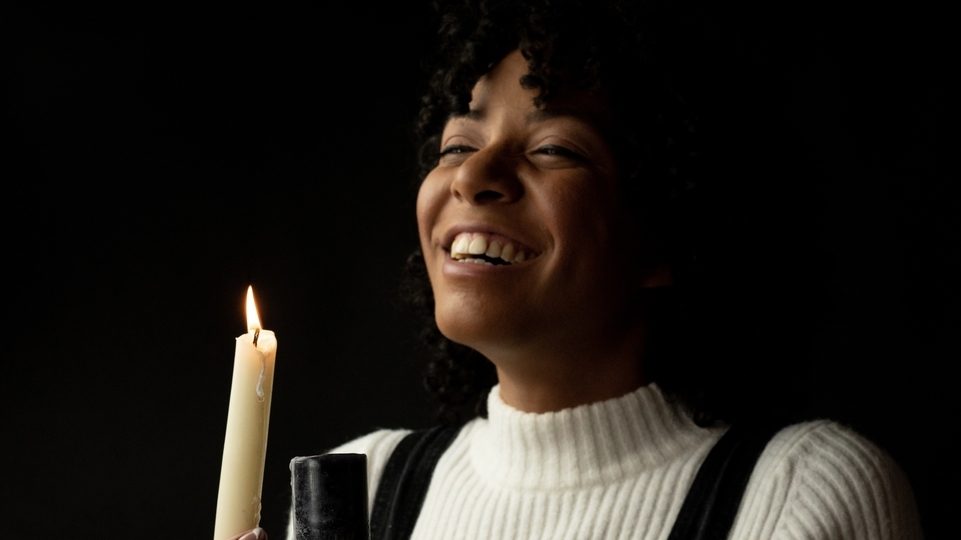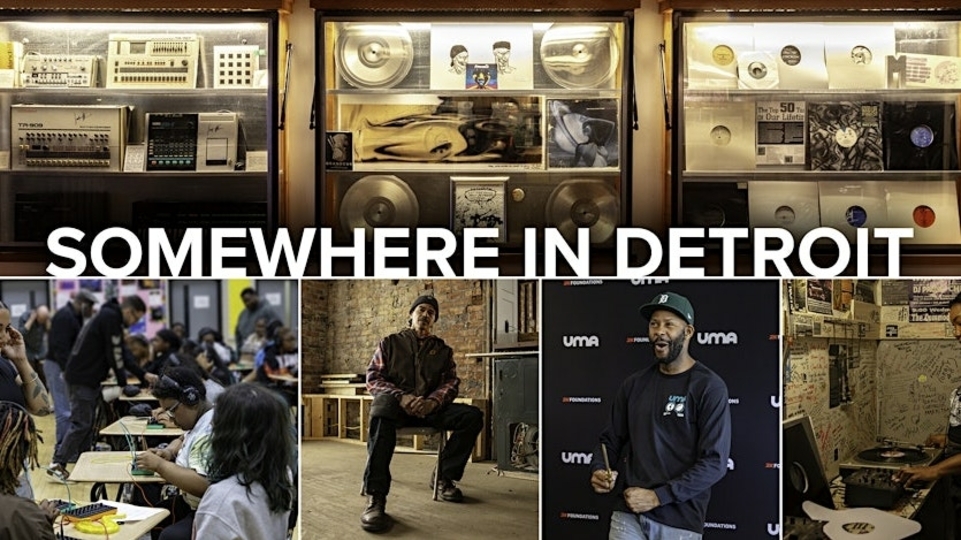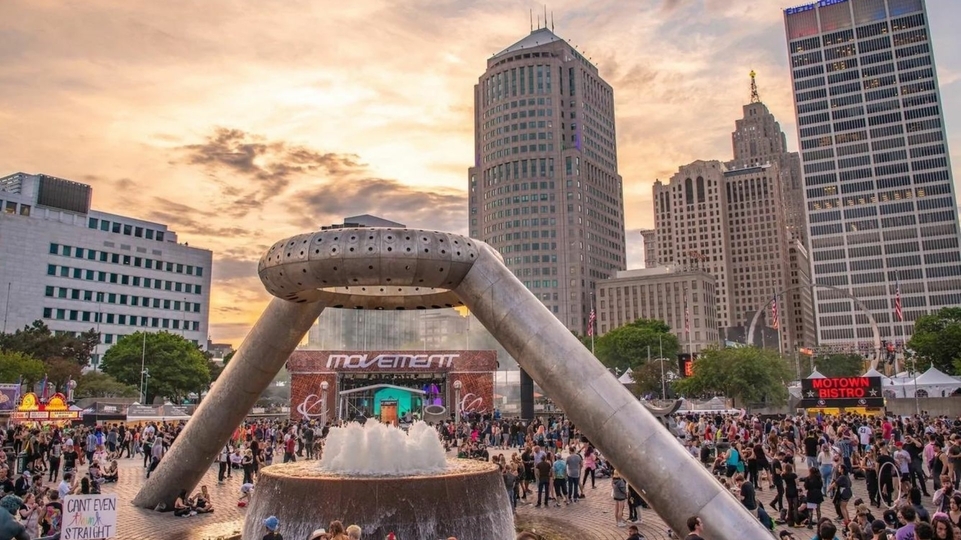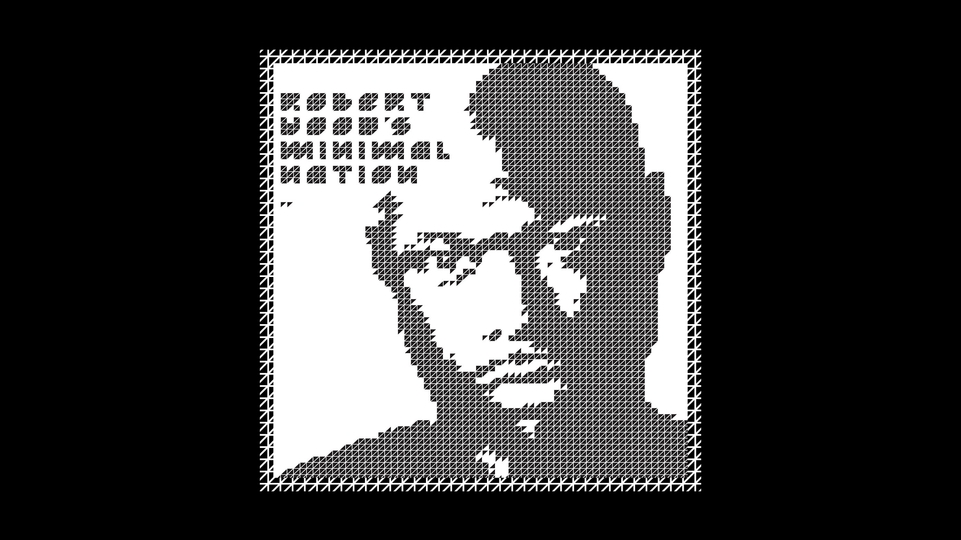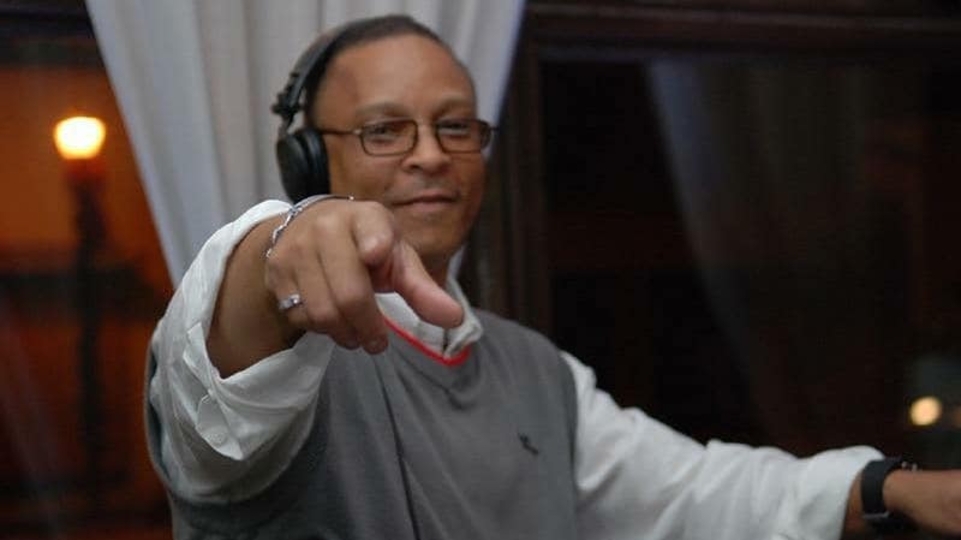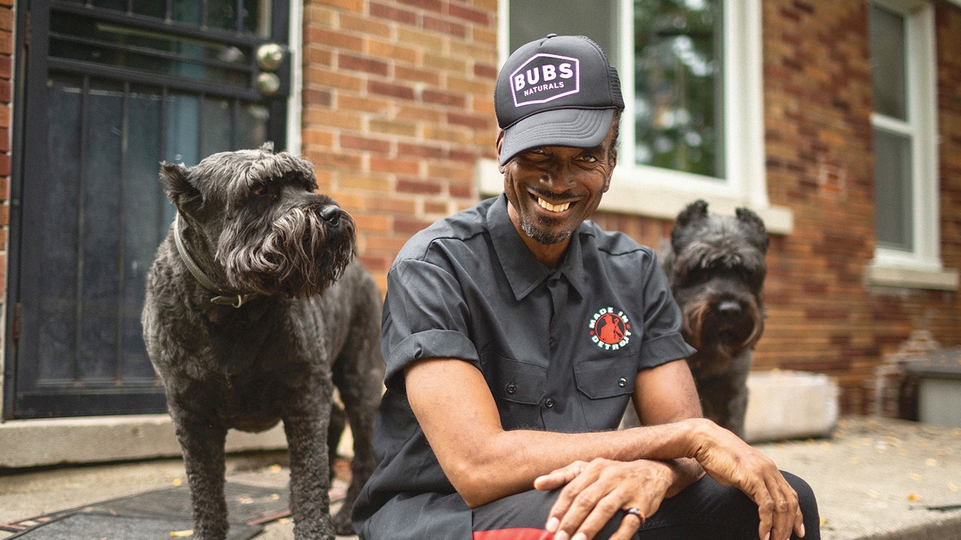
Detroit's Octave One on their contemplative new album, and three decades of techno innovation
Over three decades after bursting onto the scene with tracks like ‘I Believe’ and ‘Falling In Dub’, Detroit second-wavers Lawrence and Lenny Burden are back with a new LP, the contemplative ‘Never On Sunday’. As they prepare to play this month’s Movement festival, DJ Mag catches up with the brothers to talk about the album, their creative process, and just how they became so adept at packing their live gear
Lawrence and Lenny Burden, together known as Octave One, have Detroit techno running through their veins. Since the release of their debut single, 1990's 'I Believe' — recorded at Juan Atkins’ Metroplex studio, released on Derrick May's Transmat, and remixed at Kevin Saunderson’s KMS studio — they've been among the core members of the city’s second wave of techno producers. And yet, Octave One has always stood apart from its Motor City cohort.
Since their earliest days, the brothers’ sound has regularly slipped free of the parameters of what most people think of as Detroit techno and into a pan-global form of electronic music. It’s a sonic freedom that the Burdens are proud of — and why not? After all, it’s kept them going for well over three decades. “Really, that first record already didn’t sound like anything else that was coming out of Detroit,” Lawrence says over Zoom from Atlanta, where both he and Lenny have lived for 15 years. “[Detroit vet] Eddie Fowlkes once was like, ‘You know, I don’t know why people like your music! You don’t make techno!’ But guess what? This is what techno is!”
“We’ve always been all over the map,” Lenny adds. “Anything that we’re doing now, even with this new record, it’s just the evolution of what we did in the past, of our original sound. We can only sound like the Burden brothers.”
That new record he’s referring to is ‘Never On Sunday’, a two-disc album release on their 430 West label featuring 10 original tracks, along with instrumental edits and remixes from Orbital, Skream, and Giorgia Angiuli, among others. It’s the pair’s first full-length since 2018’s ‘Endustry’, credited to Random Noise Generation.
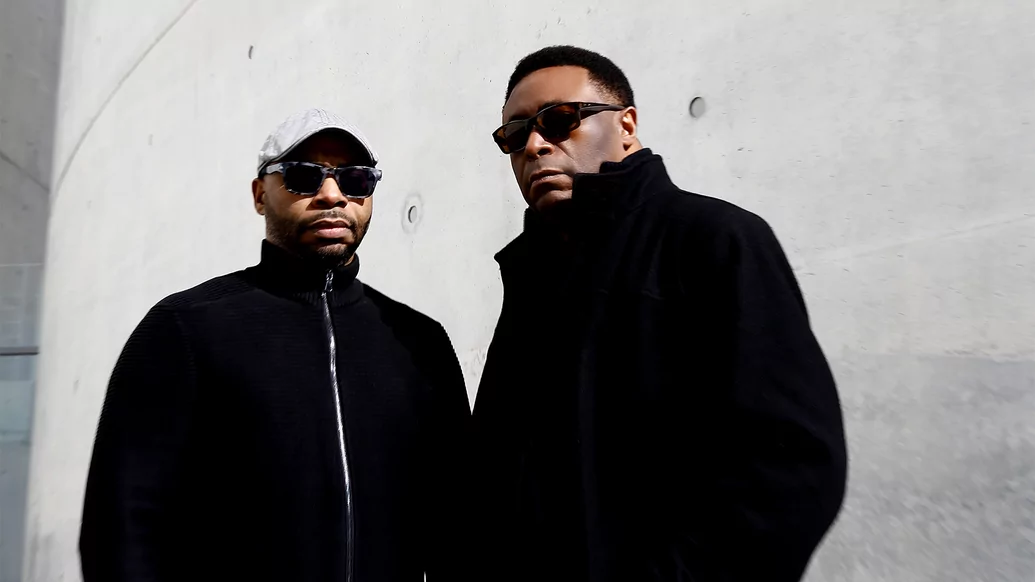
The Burdens originally used their various monikers to compartmentalise their music, with Random Noise Generation set aside for sample tracks. (“For that first Random Noise Generation record, [1991’s] ‘Falling In Dub’, we were actually emulating ‘Big Fun’ and ‘Good Life’” Lenny confides.) Octave One was reserved for tracks made through pure synthesis. The Never On Sunday moniker, meanwhile, was originally set aside for their more downtempo material, with the project debuting in 1991 via ‘The Journey', a track on a split EP with MK released on Carl Craig’s old Retroactive label.
“But you know, it almost seems that as we get older, everything just melts together,” Lenny says. The original tracks on the Burdens’ new album, for the most part, stray from the pumping club material that Octave One is most known for, instead alternating between textured downtempo material and dark-hued pop, with a near-gothic vibe threading through many of the cuts. (The outlier is ‘Mona’, an eyes-to-the-sky shimmer of a tune.) The men behind the music themselves have a bit of difficulty in pinning down just how to define the music.
“It’s us experimenting with sounds, just trying to, like, morph sounds through experimentation,” Lenny says. “But it’s not really experimental — I don’t know what to call it, to be honest!” “It’s a vibe, that’s what it is,” Lawrence adds.
‘Never On Sunday’, the album, grew out of a project credited to Never On Sunday, the pseudonym. It began to take shape in 2018, when the brothers were invited to perform an audio-visual concert in Rome.
“We’re so used to doing banging club stuff,” Lenny says. “But we had an opportunity doing this show in a museum, where we could just play anything we wanted to play, so we started constructing the show as a Never On Sunday show. We got the vocalist and started working on stuff.” (That vocalist is Karina Mia, whose voice, placed front and center of the mix, is on several of the LP’s cuts.) “It took us a couple of months to come up with enough material for a 45-minute set.”
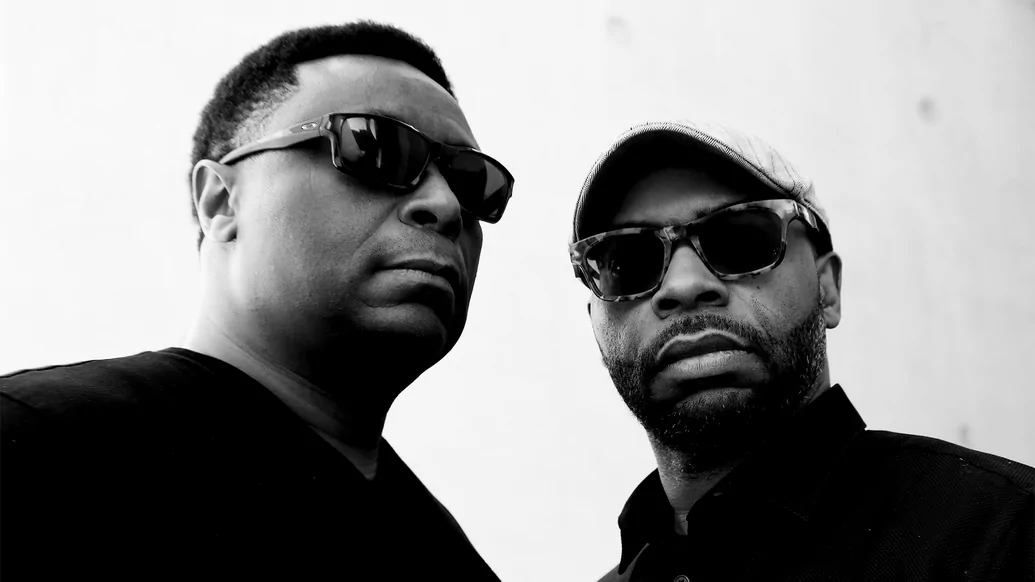
“In the beginning, we had no idea we could do this for a living. All we knew we had a very expensive hobby, and we were glad when the hobby started paying for itself” — Lenny Burden
“We were so nervous about it,” Lawrence continues, “but it came together so good, and the crowd really got into it. We were just like, ‘this music is something we’ve always wanted to express.’ This was something we just had to get out of our systems, something that we just had to create. But we were so caught into the dancefloor culture of everything.”
“We’ve done a few shows, a short list of them, that have been life-changing,” Lenny says, “and that was one of them.” The downtime that came with the pandemic enabled Octave One to step back from their usual style, what Lenny terms their “banging club stuff”, and the pair — as usual, with input from their brothers Lynell, Lorne, and Lance — got to work refining the tracks they had created for the Rome show.
“The pandemic gave us time to just kind of sit back and not have to feed the dancefloor,” Lawrence says. “We could instead feed the mind and feed the emotions.” The first fruits of that endeavor came via 2022’s vinyl-only ‘Contemplate’ EP, released on 430 West and credited to Octave One Presents Never On Sunday. “We got a lot of satisfaction from when we made that record, so it was like, ‘ok, let’s finish this idea. Let’s make an album.’”
According to Lenny, most Octave One tracks are made pretty much on the fly: Head into the studio on a Friday with a blank slate, work on music, and master whatever they had come up with on a Monday. In part, that was to feed the ravenous beast of their live performances, which have been the pair’s bread and butter for decades.
“The energy of the moment, that’s really what dance music is about,” he says. “Set the drum machines up, set the basslines, play around with it — that’s how some of our biggest records were made.” But the pandemic lessened the need for speed, allowing them to take their time on the album’s tracks — reconstructing ‘Contemplate’’s original six tunes from the ground up, crafting four new ones, making the edits, gathering the remixes, and everything else that’s involved in putting together a 20-cut record.
“We’d think about it, like, ‘We should try this or that because I heard some Depeche Mode things that were really interesting’ or whatever,” Lawrence recalls. But having the luxury of time presented its own problems. “We second-and third-guessed ourselves, remaking things and trying other approaches.”
Lenny nods in agreement. “You keep trying, and you think you’re getting close, and you live with it for a couple of months — and then it’s like, ‘ah, that’s not it.’ You go back in and you bring up some more synthesisers, or you work on processing the sounds again. Every track probably has close to 10 versions! Eventually, it’s time to let it go, but hopefully people can hear that we didn’t make a disposable album, because so much music is so disposable nowadays. Maybe they can hear it a couple of times, and be like, ‘Ok, I didn’t hear that part in here. I appreciate it a bit more.’”
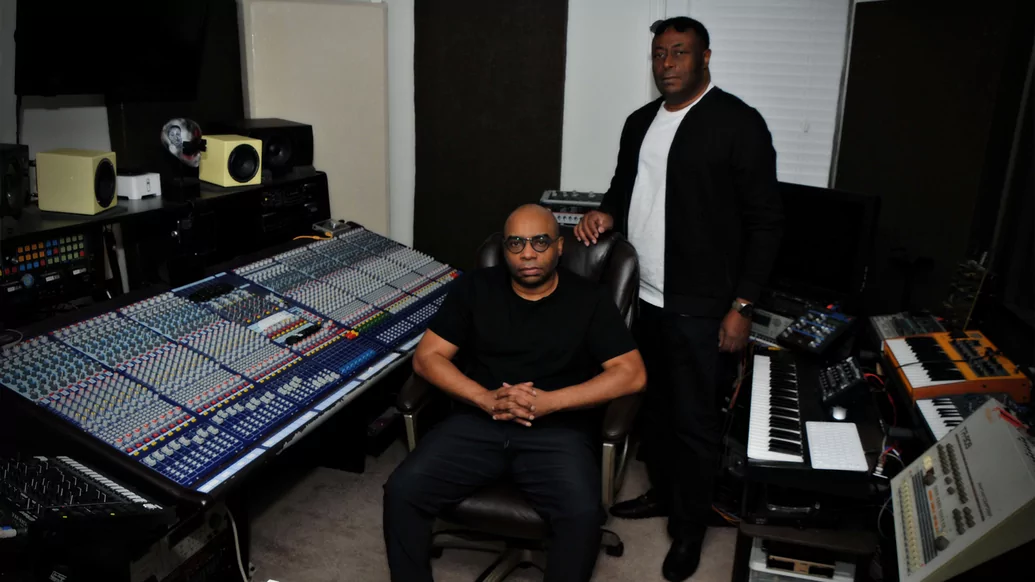
“We were talking to this one DJ, and asked him if he ever thought about retiring, and he said, ‘For what? They fly me around the world to play music — it’s living the dream!’” — Lenny Burden
Octave One has long been exclusively a live unit; Lawrence, originally the record-spinning brother of the two, gave up the DJing arts years ago. “I remember one of my favourite mixes was something from Model 500 to Janet Jackson’s ‘Pleasure Principle’, I would ride tunes like that, mixing underground and pop together,” he recalls. “I tell people that I still DJ, but I DJ with 32 tracks, not just two tracks.”
The pair had learned the touring ropes before Octave One had even sprung to life — both Lenny and Lawrence had served time as roadies, most notably with the famed, oft-sampled jazz keyboardist and producer Bob James.
“And I worked with a wedding band, man,” Lenny adds with a laugh. “That’s what taught us how to be able to move all of this equipment. We learned how to pack, and hopefully prevent most of it from getting broken into small pieces of plastic. People would see how we’d pack everything up, and they’d be, ‘That can’t be all your stuff!”
According to Lawrence, if it weren’t for Bob James, there might not have been an Octave One at all. “He’s one of the people who inspired us to try to do records for a living,” he explains. “He’d heard some stuff that we were playing in the studio; I wanted him to hear it just to let him know, hey, this is what we do. He was the head of A&R of jazz at Warner Brothers at the time, and he took it to the head of A&R in the dance department.” They didn’t get signed, but it gave the duo a dose of confidence that they were on the right track. “I was like, ‘You believe in us that much?’ That let us know that we had something that we can contribute.”
They’ve been contributing ever since, something the Burdens still seem to have trouble believing. “In the beginning, we had no idea we could do this for a living,” Lenny says. “People like Kevin [Saunderson], we didn’t know how he was making money. All we knew is, we had a very expensive hobby, and we were glad when the hobby started paying for itself. A record would sell, and we could buy more gear, and that was pretty much it. That was such a huge, huge achievement.”
“It’s still just like it was — it’s for the love of doing it,” Lawrence says. “You just put things out and are glad when people are appreciating them. That’s the rush. I still love it.”


With a new album in the shops, Octave One has a busy summer of touring ahead of them — but first, the Burdens will be returning to their roots when they play at Detroit’s Movement festival later this month. Is there any added pressure when playing in front of the hometown crowd? At first, both Lenny and Lawrence claim there isn’t — but later in the conversation, Lenny reconsiders.
“All your peers are there, people you’ve known for 30 years,” he says. “They’re like, ‘Let me see it! Entertain me!’ So yeah, there’s a lot of pressure.” They’ve played the festival numerous times before, and they probably will many times more — 33 years after the release of ‘I Believe', there’s no thought of calling it quits.
“We were talking to this one DJ,” Lenny relates, “and asked him if he ever thought about retiring, and he said, ‘For what? They fly me around the world to play music — it’s living the dream!’ And we still love doing it too, man. Playing live, it’s a rush when people react to your music. And I get a lot of joy just from setting up — I’m having the time of my life. You could pay me to just do that!”
“And it’s always a blast,” Lawrence adds, “to hear your stuff playing loud.” A blast for them — and an even bigger blast for the rest of us.

